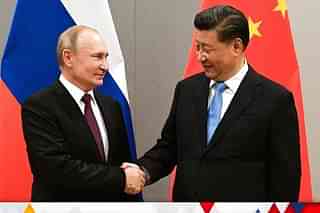Science
Katalin Karikó, Drew Weissman Win 2023 Nobel Prize In Medicine For Research Enabling Development Of mRNA Covid-19 Vaccines
Karan Kamble
Oct 02, 2023, 06:11 PM | Updated 06:11 PM IST
Save & read from anywhere!
Bookmark stories for easy access on any device or the Swarajya app.

The Nobel Prize in Physiology or Medicine for 2023 has been jointly awarded to Katalin Karikó and Drew Weissman by the Nobel Assembly at Karolinska Institutet.
This prestigious recognition is in honour of their groundbreaking discoveries related to nucleoside base modifications that paved the way for the development of highly effective mRNA vaccines against Covid-19 during the global pandemic that began in early 2020.
Their findings have revolutionised the understanding of how mRNA interacts with the immune system, contributing to the rapid development of vaccines in the face of one of the most significant health threats of our time.
More than 13 billion doses of Covid-19 vaccines have been administered globally, thanks to the rapid development of various vaccines against SARS-CoV-2.
These vaccines have played a crucial role in saving millions of lives and preventing severe illness, allowing societies to gradually return to normal. The Nobel laureates of this year have made significant contributions to this transformative development.
Vaccination is a process that stimulates the body's immune response to a specific pathogen, providing a preemptive defense against future exposure to the same disease.
Traditional vaccines have relied on weakened or inactivated viruses, such as those used against polio, measles, and yellow fever.
Advancements in molecular biology have led to the development of vaccines based on specific components of viruses rather than the entire virus itself.
By using parts of the viral genetic code that encode proteins found on the virus surface, vaccines can stimulate the production of antibodies that block the virus.
Examples of such vaccines include those against hepatitis B and human papillomavirus.
Another approach involves transferring parts of the viral genetic code to a harmless carrier virus, known as a "vector."
This method is used in vaccines against the Ebola virus, where the selected viral protein is produced within our cells, triggering an immune response targeted against the virus.
Producing vaccines on a large scale often requires extensive cell culture, which can be resource-intensive and limit the ability to respond quickly to outbreaks and pandemics.
Researchers have long sought to develop vaccine technologies that are independent of cell culture, but this has proven challenging.
During the 1980s, a breakthrough was made with the introduction of in vitro transcription, a method for producing mRNA without the need for cell culture. This advancement greatly accelerated molecular biology applications in various fields.
The idea of using mRNA technologies for vaccines and therapies gained traction, but there were obstacles to overcome.
In vitro transcribed mRNA was considered unstable and difficult to deliver, requiring the development of sophisticated carrier lipid systems. Additionally, it caused inflammatory reactions. As a result, initial enthusiasm for clinical applications of mRNA technology was limited.
Despite these challenges, Hungarian biochemist Katalin Karikó remained dedicated to developing methods for using mRNA in therapy.
In the early 1990s, while working as an assistant professor at the University of Pennsylvania, she persisted in her vision despite facing difficulties in securing research funding, according to the Nobel prize announcement.
It was during this time that she began collaborating with immunologist Drew Weissman, who shared her passion for exploring the interactions between different RNA types and the immune system.
Karikó and Weissman made an intriguing discovery: dendritic cells recognised in vitro transcribed mRNA as a foreign substance, leading to their activation and the release of inflammatory signaling molecules.
This raised the question of why this reaction occurred with in vitro transcribed mRNA but not with mRNA from mammalian cells.
Through their research, Karikó and Weissman realised that there must be critical properties that distinguish the different types of mRNA.
Karikó and Weissman noticed that RNA from mammalian cells often undergoes chemical modifications, while in vitro transcribed mRNA does not.
They hypothesised that the absence of modified bases in in vitro transcribed RNA could be responsible for the unwanted inflammatory reaction.
After investigation, the results were remarkable: the inclusion of base modifications significantly reduced the inflammatory response.
This discovery revolutionised the understanding of how cells recognise and respond to different forms of mRNA.
Karikó and Weissman recognised the enormous implications of their findings for mRNA therapy, and these groundbreaking results were published in 2005, years before the Covid-19 pandemic.
In subsequent studies published in 2008 and 2010, Karikó and Weissman demonstrated that mRNA with base modifications greatly enhanced protein production compared to unmodified mRNA.
By discovering that base modifications not only reduced inflammatory responses but also increased protein production, Karikó and Weissman overcame significant obstacles in the path towards clinical applications of mRNA.
By 2010, several companies were actively working on the development of mRNA technology. They pursued the creation of vaccines against the Zika virus and MERS-CoV, a closely related virus to SARS-CoV-2.
Following the outbreak of the Covid-19 pandemic, two mRNA vaccines that encoded the surface protein of SARS-CoV-2 and contained base modifications were rapidly developed.
These vaccines demonstrated an impressive efficacy of around 95 per cent and received approval as early as December 2020.
The remarkable flexibility and speed of developing mRNA vaccines have opened doors for using this platform in the creation of vaccines against other infectious diseases.
In addition, this technology holds promise for delivering therapeutic proteins and treating certain types of cancer in the future. The potential applications of mRNA technology are vast and exciting.
(Read the NobelPrize.org write-up for an elaborate scientific background of the discoveries.)
Save & read from anywhere!
Bookmark stories for easy access on any device or the Swarajya app.
Karan Kamble writes on science and technology. He occasionally wears the hat of a video anchor for Swarajya's online video programmes.
Support Swarajya's 50 Ground Reports Project & Sponsor A Story
Every general election Swarajya does a 50 ground reports project.
Aimed only at serious readers and those who appreciate the nuances of political undercurrents, the project provides a sense of India's electoral landscape. As you know, these reports are produced after considerable investment of travel, time and effort on the ground.
This time too we've kicked off the project in style and have covered over 30 constituencies already. If you're someone who appreciates such work and have enjoyed our coverage please consider sponsoring a ground report for just Rs 2999 to Rs 19,999 - it goes a long way in helping us produce more quality reportage.
You can also back this project by becoming a subscriber for as little as Rs 999 - so do click on this links and choose a plan that suits you and back us.
Click below to contribute.





